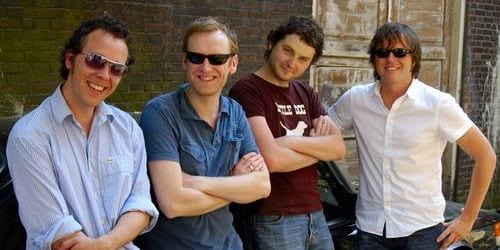
When last we heard from Johan, they were just capping off their second five-year break between albums with one of the most beautifully poetic and melodic power pop albums of 2006. Now, here it is, 2009, and for the first time in their history, they’ve cut the delay between albums from five years to three.
4 could have used two more.
Johan is a wonderful little Dutch band that involves singer-songwriter Jacco de Greeuw and a rotating cast of supporting characters, whose output to this point has consisted mostly of well-produced odes to loves lost and loves found, with occasional forays into the world of celebrity and the tolls it takes on those who experience it. The music they make is concise, catchy, and de Greeuw’s use of metaphor and narrative within the constraints of a pop song is second to few.
On the surface, 4 is no different than the three discs that preceded it — ten songs in 40 minutes, and no discernable thread or common theme to be found. The problem is just how many of these songs sound disposable, like toss-offs that would have made great B-sides or lost tracks for a download-only EP. Opener “In the Park” is fast and driving and propulsive and all that, but everything about it is cloaked in fuzz, hiding whatever melodies and hooks it may offer in a cloud of distortion. “Comes a Time” features flutes in its chorus, and the bridge especially sounds like something that should be the sort of soaring, emotional moment we’ve come to expect from Johan, but it just doesn’t grab you like previous songs in the band’s catalog did. “Over” almost sounds like a Cure song, what with its repetitive tack piano and its longing lyrics, but the detached feel of the vocals is at odds with what surely should have been a terribly dramatic performance. You know, the kind of performance Robert Smith would have turned in.
Part of the issue might lie in the travails of a band taking its first steps into true “bandhood”, as opposed to “one guy and his buddies-hood”. There are songs on 4 that were actually written by people other than de Greeuw, and it shows: “Maria” is a simple, shimmery love song written and sung by guitarist Maarten Kooijman, and while it’s a fine enough song, not even the accordion at the beginning or the strings later on can make an unexciting melody memorable. Bassist Diets Dijkstra’s “Alone Again” could have been an interesting palette cleanser, a quiet ode to lost love with factory machinery clattering away in the distance, but it barely exists until it’s over. Undermixed vocals and lazy parallel-fifth vocal harmonies doom it to obscurity.
It’s almost as if trying to incorporate the rest of the band into the songwriting process necessarily stifled de Greeuw’s own creativity, which blossoms in flashes over the course of the album. “Something About You” is a quiet, almost creepy rumination on near-parasitic dependence that can’t help but draw listeners to its vaguely noir style, but 4‘s best song is its last, a beautiful little piece called “Why Don’t We”. This might be the most straightforward love song de Greeuw has ever written, even as it presents an optimistic outlook to a relationship that has apparently already failed. By presenting his case for hope in the first three minutes, and just staying quiet for the latter half of the six-plus-minute song while it builds and soars into the treetops, he makes the case that album number five may well be a masterpiece.
Perhaps he should allow for the five years it might take to realize such potential.

![Call for Papers: All Things Reconsidered [MUSIC] May-August 2024](https://www.popmatters.com/wp-content/uploads/2024/04/all-things-reconsidered-call-music-may-2024-720x380.jpg)



